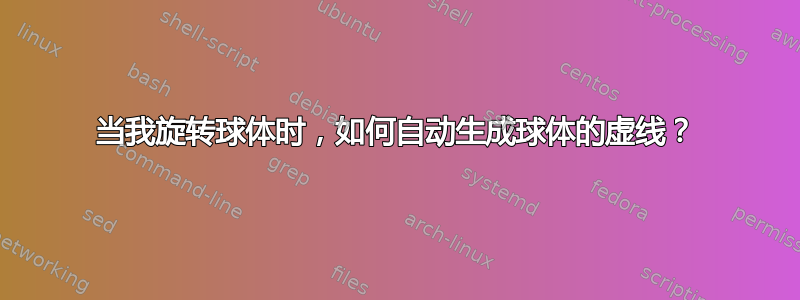
我从这里复制了这段代码这里
settings.render=8;
import solids;
size(5cm);
currentprojection=orthographic(1,0.3,0.3);
revolution b=sphere(O,1);
draw(surface(b),white+opacity(.5));
skeleton s;
b.transverse(s,reltime(b.g,0.5),P=currentprojection);
draw(s.transverse.back,dashed);
draw(s.transverse.front);
draw(rotate(90,X)*s.transverse.back,dashed);
draw(rotate(90,X)*s.transverse.front);
real rayon=0.8, phi=90, theta=45;
triple pM=dir(phi,theta);
draw((O--pM),dashed+green+0.7bp,Arrow3(size=7));
label(Label("$\psi$",yellow),pM,0.5dir(-90));
xaxis3("$x$",1,1.5,Arrow3);
xaxis3(-1.3,1,linetype(new real[] {8,8}));
yaxis3("$y$",1,1.5,Arrow3);
yaxis3(-1.3,1,linetype(new real[] {8,8}));
zaxis3("$z$",1,1.5,Arrow3);
zaxis3(0,1,linetype(new real[] {8,8}));
并尝试在这里编译http://asymptote.ualberta.ca/
我手动旋转输出,结果似乎不正确。

我怎样才能得到结果像这样?
答案1
正如 John Kormylo 的评论,我认为您不能用鼠标旋转球体(如果您使用 TikZ)。我们希望,将来 Asymptote 可以做到这一点(旋转球体时保留自动虚线!)。您可以尝试此代码。我希望它对您有所帮助。
\documentclass[tikz,border=3mm]{standalone}
\usetikzlibrary{3dtools}% https://github.com/marmotghost/tikz-3dtools
\begin{document}
\pgfdeclarelayer{background}
\pgfdeclarelayer{foreground}
\pgfsetlayers{background,main,foreground}
\foreach \Angle in {5,15,...,360}
{\begin{tikzpicture}[3d/install view={phi=\Angle,theta=70},line cap=butt,
line join=round,visible/.style={draw,solid},
hidden/.style={draw,very thin,cheating dash},declare function={R=5;}]
\path (0,0,0) coordinate (I)
foreach \Z in {-75,-60,...,75}
{(0,0,{R*sin(\Z)}) coordinate (I\Z)}
foreach \Z in {-75,-60,...,90}
{({cos(\Z)},{sin(\Z)},0) coordinate (n\Z)};
\shade[ball color=white,3d/screen coords,opacity=0.8] (I) circle[radius=R];
%
\path foreach \Z in {-75,-60,...,90}
{pic{3d/circle on sphere={R=R,C={(I)},P={(I)},n={(n\Z)},
fore layer=foreground,back layer=background}}};
%
\path foreach \Z in {-75,-60,...,75}
{pic{3d/circle on sphere={R=R,C={(I)}, P={(I\Z)},fore layer=foreground,back layer=background}}};
\end{tikzpicture}}
\end{document}



